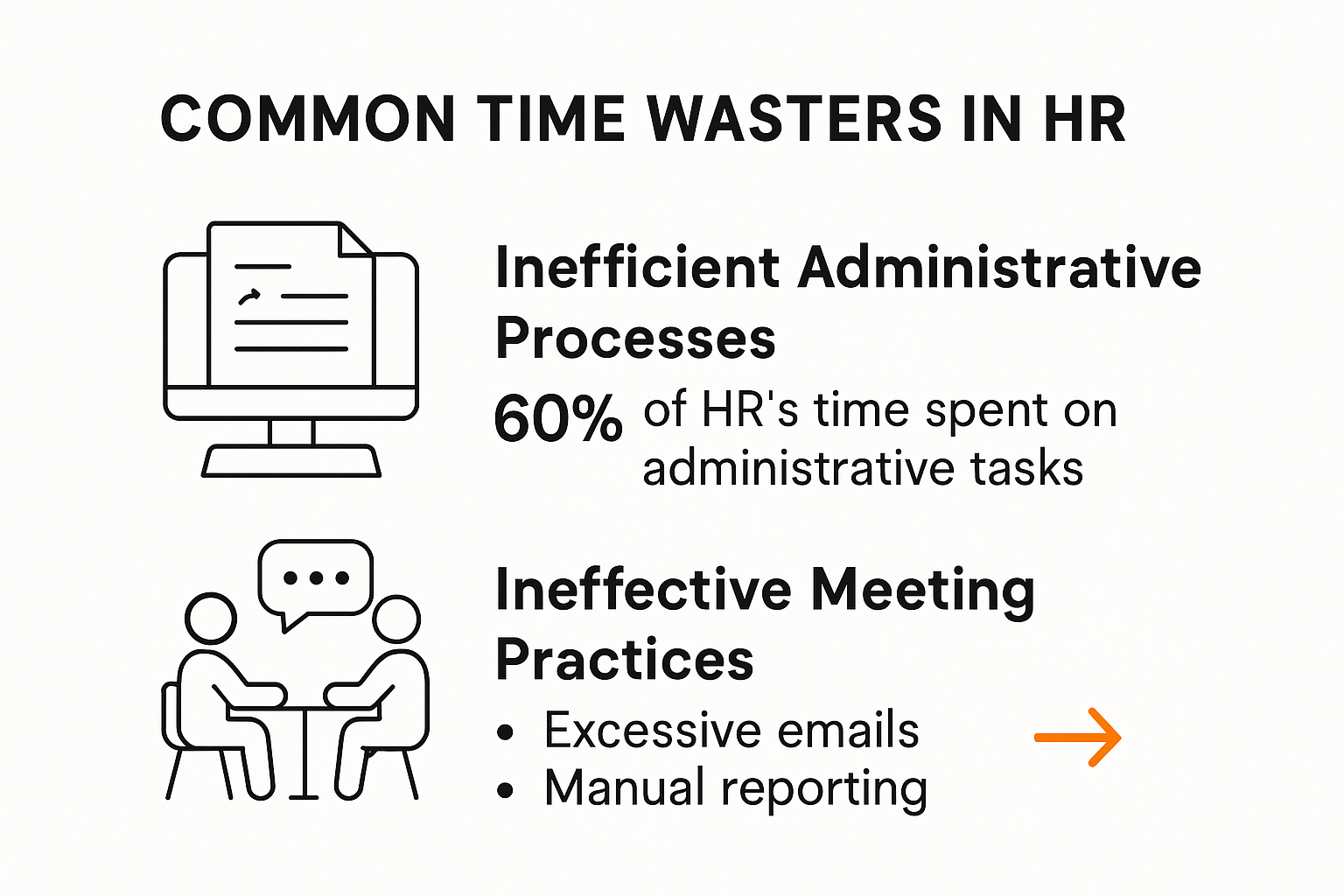HR teams juggle endless recruitment cycles, policy updates, and employee issues every day. Yet most people do not realize that 60 percent of HR’s time gets swallowed by repetitive administrative tasks instead of meaningful work. What makes this even more surprising is that by fixing just a few time traps, HR can shift from routine task managers to strategic leaders shaping the company’s future.
Table of Contents
- Why Time Management Matters In HR
- Common Time Wasters In HR Roles
- Proven Time Management Strategies For HR
- Top Tools And Apps For HR Efficiency
Quick Summary
| Takeaway | Explanation |
|---|---|
| Prioritize high-impact activities. | Focus on tasks that directly drive organizational growth and employee engagement for better results. |
| Minimize administrative tasks. | Streamline processes by automating repetitive work, freeing up time for strategic initiatives. |
| Leverage technology for efficiency. | Use tools like HR management software to centralize tasks and reduce workload. |
| Implement effective meeting practices. | Ensure meetings have clear agendas and necessary attendees to enhance productivity. |
| Develop personal productivity habits. | Identify peak work times and minimize distractions to improve overall efficiency. |
Why Time Management Matters in HR
Time management is not just a skill but a critical strategic capability for HR professionals navigating increasingly complex workplace environments. In the fast-paced world of human resources, the ability to effectively allocate time and prioritize tasks can mean the difference between reactive firefighting and proactive workforce management.
The Cost of Poor Time Management in HR
Ineffective time management creates significant challenges for HR departments. According to research from the University of Florida, poor time allocation can lead to substantial productivity losses and increased organizational stress. HR professionals often find themselves overwhelmed by administrative tasks, recruitment processes, employee relations, and strategic planning—all of which require precise and deliberate time investment.
The consequences of mismanaged time extend beyond individual performance. When HR teams struggle with time management, critical functions like talent acquisition, employee development, and organizational culture building suffer. This can result in higher turnover rates, decreased employee engagement, and missed opportunities for strategic workforce planning.
Strategic Benefits of Effective Time Management
Rutgers University highlights that strong time management skills enable HR professionals to accomplish goals more efficiently while maintaining a healthy work-life balance. By implementing structured approaches to task prioritization, HR teams can transform their role from administrative support to strategic business partners.
Effective time management allows HR professionals to:
- Prioritize High-Impact Activities: Focus on strategic initiatives that drive organizational growth
- Reduce Administrative Burden: Minimize time spent on repetitive tasks through smart workflow design
- Enhance Employee Experience: Allocate more time to meaningful interactions and talent development
For those looking to improve their task management skills, our comprehensive guide on task effectiveness offers practical strategies tailored for modern professionals.
Ultimately, time management in HR is about creating strategic space for meaningful work. By mastering time allocation, HR professionals can shift from being process administrators to becoming true organizational architects who shape workplace culture, drive employee engagement, and contribute directly to business success.
Common Time Wasters in HR Roles
HR professionals frequently encounter numerous time-consuming activities that can significantly drain productivity and reduce strategic effectiveness. Understanding and identifying these time wasters is crucial for developing more efficient workflows and maximizing professional potential.
Inefficient Administrative Processes
Administrative tasks often consume a disproportionate amount of HR professionals’ time. According to research from Deloitte, HR teams spend approximately 60% of their time on administrative and transactional activities rather than strategic initiatives. These low-value tasks include manual data entry, paperwork processing, scheduling interviews, and maintaining employee records.
Common administrative time wasters include:
- Repetitive Data Management: Manually updating spreadsheets and databases
- Email Management: Spending excessive time sorting and responding to routine communications
- Redundant Reporting: Creating multiple versions of similar reports across different systems
Ineffective Meeting Practices
Harvard Business Review reports that professionals spend an average of 23 hours per week in meetings, with many of these being unproductive. HR roles are particularly susceptible to meeting-related time waste, often involving lengthy discussions that lack clear objectives or actionable outcomes.
Meeting-related time wasters include:
- Unclear Agendas: Meetings without specific goals or structured discussion points
- Unnecessary Attendees: Inviting team members who do not contribute directly to the discussion
- Lack of Time Management: Meetings that consistently run over their allocated time
To help HR professionals quickly identify and address common workflow challenges, the table below summarizes major time wasters in HR roles along with typical examples of each.
| Time Waster | Common Examples |
|---|---|
| Repetitive Data Management | Manually updating spreadsheets and databases |
| Email Management | Excessive time sorting/responding to routine communications |
| Redundant Reporting | Creating similar reports in different systems |
| Unclear Meeting Agendas | Meetings lacking specific goals or structure |
| Unnecessary Meeting Attendees | Inviting non-essential participants to discussions |
| Poor Meeting Time Management | Meetings that run over allocated time |
For professionals seeking to optimize their workflow, our guide on task management strategies provides practical techniques for reducing time waste.
Addressing these time wasters requires a proactive approach. HR professionals must continually evaluate their processes, leverage technology for automation, and develop strategies that prioritize high-impact activities. By minimizing administrative overhead and streamlining workflow, HR teams can transform from transactional support roles to strategic organizational partners who drive meaningful business outcomes.

Proven Time Management Strategies for HR
Effective time management is a critical skill for HR professionals seeking to maximize productivity and strategic impact. By implementing targeted strategies, HR teams can transform their approach to work and deliver more value to their organizations.
Prioritization and Task Management
Research from the University of Florida’s Institute of Food and Agricultural Sciences emphasizes the importance of strategic task prioritization. HR professionals must develop a systematic approach to organizing and completing tasks that align with organizational objectives. This involves understanding the difference between urgent and important work.
Key prioritization techniques include:
- Eisenhower Matrix: Categorizing tasks based on urgency and importance
- Time Blocking: Dedicating specific time slots to critical HR functions
- Weekly Planning: Reviewing and scheduling tasks in advance
Our comprehensive guide on task management offers additional insights into creating more efficient workflows.
Technology and Automation Strategies
UCLA Campus Human Resources highlights the critical role of technology in minimizing time-consuming administrative tasks. HR professionals can leverage various tools and platforms to streamline processes and reduce manual workload. Automation technologies can handle repetitive tasks such as data entry, scheduling, and basic communication.
Essential technology strategies include:
- HR Management Software: Centralizing employee data and processes
- Automated Screening Tools: Simplifying recruitment workflows
- Communication Platforms: Reducing email clutter and improving team collaboration
Personal Productivity Techniques
The University of Georgia Extension recommends developing personal productivity habits that support more effective time management. This involves understanding individual work patterns, minimizing distractions, and creating an organized workspace.
Personal productivity strategies include:
- Energy Management: Identifying and working during peak productivity hours
- Distraction Elimination: Creating focused work environments
- Regular Breaks: Implementing strategic rest periods to maintain mental clarity
Successful time management in HR is not about working harder but working smarter. By combining technological solutions, strategic prioritization, and personal productivity techniques, HR professionals can transform their approach to work. The goal is to create space for high-impact activities that drive organizational success and employee engagement.
Top Tools and Apps for HR Efficiency
In the digital age, HR professionals have access to an array of sophisticated tools and applications designed to streamline workflows, enhance productivity, and transform traditional administrative processes. Selecting the right technological solutions can significantly reduce time spent on repetitive tasks and enable more strategic human resource management.
Recruitment and Talent Management Tools
The Society for Human Resource Management (SHRM) emphasizes the critical role of technology in modern HR practices. Recruitment and talent management tools have revolutionized how organizations attract, screen, and retain top talent.
Key tools in this category include:
- Applicant Tracking Systems (ATS): Automate candidate screening and resume management
- Video Interview Platforms: Enable remote interviewing and candidate assessment
- Candidate Relationship Management (CRM) Software: Track and engage potential talent pools
Workforce Management and Administrative Tools
The U.S. Department of the Treasury’s Administrative Resource Center highlights the importance of comprehensive HR management software. These tools centralize employee data, streamline administrative processes, and provide critical insights into workforce dynamics.
Essential workforce management tools include:
- Time and Attendance Tracking Systems: Automate scheduling and payroll processes
- Employee Performance Management Platforms: Track goals, conduct reviews, and manage development
- HR Analytics Tools: Generate insights on workforce trends and employee engagement
Learn more about automation strategies for business efficiency to complement your HR technology approach.
Communication and Collaboration Platforms
Modern HR professionals require robust communication tools that facilitate seamless interaction across distributed teams. These platforms go beyond traditional email, offering integrated solutions for team collaboration, knowledge sharing, and real-time communication.
Top communication tools include:
- Team Messaging Apps: Enable instant communication and quick problem-solving
- Virtual Meeting Platforms: Support remote interviews and team meetings
- Internal Knowledge Base Systems: Create centralized repositories of company policies and resources
Selecting the right technological tools is about more than just purchasing software. HR professionals must carefully evaluate their organization’s specific needs, integration capabilities, and long-term scalability. The most effective HR technology stack is one that seamlessly combines multiple tools to create a comprehensive, efficient workflow that supports both administrative functions and strategic human capital management.
The following table organizes top HR tools and apps into three main categories to assist HR professionals in selecting the right solutions for efficiency and productivity.
| Tool Category | Key Examples | Main Purpose |
|---|---|---|
| Recruitment & Talent Management | ATS, Video Interview Platforms, CRM Software | Automate recruitment and candidate management |
| Workforce Management & Admin | Time & Attendance Tracking, Performance Platforms, HR Analytics Tools | Centralize data, track performance, analyze workforce |
| Communication & Collaboration | Team Messaging Apps, Virtual Meeting Platforms, Internal Knowledge Bases | Improve team communication and knowledge sharing |
By embracing these technological solutions, HR professionals can transform from administrative support roles to strategic partners who drive organizational success through intelligent, data-driven human resource management.

Frequently Asked Questions
What are the main time management challenges faced by HR professionals?
HR professionals often struggle with ineffective administrative processes, excessive time spent in unproductive meetings, and a lack of structured prioritization for high-impact tasks.
How can technology help improve time management in HR?
Technology can streamline repetitive administrative tasks through automation, centralize employee data with HR management software, and improve communication and collaboration among teams, thus freeing up time for strategic initiatives.
What strategies can HR professionals use to prioritize their tasks?
HR professionals can employ techniques like the Eisenhower Matrix to categorize tasks by urgency and importance, time blocking to allocate specific time slots for critical functions, and weekly planning to organize tasks in advance.
How can effective time management benefit employee engagement?
Effective time management allows HR professionals to focus on strategic initiatives, enhance employee experiences through meaningful interactions, and ultimately improve retention and engagement by addressing employee needs proactively.
Transform HR Time Management With Intelligent Automation
Every HR professional knows that repetitive tasks and manual workflows eat up hours that could be spent on strategic initiatives. The article revealed that administrative overload and inefficient collaboration prevent HR from becoming proactive business partners. If you want to stop losing valuable time to data entry, meeting scheduling, and task tracking, Gammatica.com offers a smarter solution to regain control over your workday.

Upgrade your HR team’s productivity now with Gammatica’s AI-powered management platform. Discover how automated task management, time-saving templates, and seamless integrations tackle your exact pain points. Take the first step and explore Gammatica’s features for smarter team coordination, so you can start saving up to 16 hours each week and focus on the HR strategy that truly moves your company forward.



